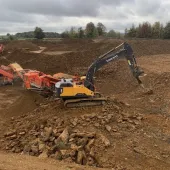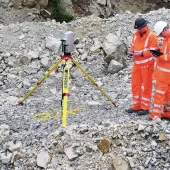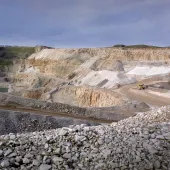MPA/RTPI Mineral Planning Conference 2014

Thought-provoking national event debates crucial issues on the theme of sustainable minerals supply
THE annual MPA/RTPI Mineral Planning Conference which took place last week at Edgbaston Cricket Stadium attracted top speakers from the Department for Communities and Local Government (DCLG), The Wildlife Trusts, The Planning Officers Society, among others, along with 185 delegates and exhibitors.
The theme of the national event, which each year tackles the crucial mineral planning issues of the day, was ‘Sustainable Minerals Supply – Are We There Yet? The Influence of the National Planning Policy Framework’.
The conference looked at whether the presumption in favour of sustainable development, formalized in the National Planning Policy Framework (NPPF) more than two years ago, has in fact resulted in any changes to the way that the regulatory processes work together to deliver sustainable development.
The core of the conference was a lively facilitated debate, complemented by presentations from differing perspectives which were aimed at prompting a fully rounded discussion. The morning session, chaired by Hugh Lucas of Mineral Products Association (MPA), started with an update from DCLG, followed by presentations around ‘Delivering Sustainable Materials’.
Louise Barr, deputy director of planning, infrastructure & environment at DCLG, said: ‘Securing a sustainable supply of minerals is essential to sustainable economic growth. That is why, through the National Planning Policy Framework and planning guidance, we have recognized the essential role of mineral extraction in the right places, and aftercare and restoration to high environmental standards.’
In his presentation, Ross Halley of Lafarge Tarmac concluded that whilst the regulatory tools to support sustainable development are starting to align, the system still does not deliver efficiently. A show of hands indicated that a majority of the delegates were still unconvinced that the more localist approach to planning, based on the NPPF, was functioning as it needed to.
Lonek Wojtulewicz of The Planning Officers Society said that when we think about sustainable development, extraction of minerals is not usually the first thing that springs to mind. He suggested that some definitions of sustainability are not a good fit with mineral working. ‘Planning for sustainable mineral supply requires an understanding that mineral development should give more back to society than has been taken out and that means having a vision of what future generations will need and value,’ he said.
Trefor Owen delivered a perspective on sustainable development from the viewpoint of the new regulatory body Natural Resources Wales (NRW). Delegates were told about the new primary legislation behind resource management in Wales and the ‘ecosystems approach’ that underpins all NRW’s work. NRW accept their role as advisors to the planning system and would always do that on the basis of a risk-based, rather than a precautionary, approach.
Stephanie Hilborne OBE, chief executive of The Wildlife Trusts, said: ‘Our health, well-being and prosperity all depend, ultimately, on having a rich and healthy natural environment, and that healthy natural environment depends for its own future (and its ability to provide for our needs) entirely on society’s attitudes and behaviours, and the way in which the economy operates. There is an enormous amount that good planning and enlightened mineral production can contribute to enabling society, the economy and the environment to support and strengthen each other.
‘The Wildlife Trusts are working with the minerals industry across the UK to help nature’s recovery so that a wildlife-rich ‘living landscape’ and thriving ‘living seas’ can provide for the needs of society for generations to come. Much more can be done if everyone recognizes that the needs of society, the economy and the natural environment are inseparably entwined and that the natural world needs help to recover.’
Iain Dunnett from the New Anglia Local Enterprise Partnership gave a very welcome insight into the work of the LEPs, who are well placed to provide input on the economic element of sustainable development. A show of hands revealed that very few mineral operators or mineral planning authorities were currently included in LEP work.
The afternoon session, chaired by Mark Walton at RTPI, opened with a legal update by barristers from No 5 Chambers, which covered a number of pertinent issues, ranging from the implications of changes to the Environmental Impact Assessment (EIA) Directive, to Marine Plans and recent case law on the interpretation of planning conditions and development in Green Belt.
The concluding afternoon discussion focused on ‘Minerals and the Duty to Co-operate (DTC)’.
Stephen Pratt from The Planning Inspectorate presented some examples of DTC issues that had emerged during examinations and Jackie Leask from the Planning Advisory Service summarized the main points that planning authorities should address. Richard Pestell from Peter Brett Associates gave a developer’s perspective on the issue.
Whilst the DTC was principally an issue for planning authorities, it was clear that mineral operators had an interest in ensuring that Mineral Plans do not fail as a result of non-compliance. Some delegates agreed with Richard Pestell that the DTC had been introduced to cover the void left by the regional tier of planning, but that it was not fulfilling that purpose in practice.
Nigel Jackson, chief executive of the MPA, said: ‘Mineral operators are all anxious that they should continue to go about their business in the most sustainable way but there are growing signs that regulators still haven’t fully embraced what that means for them. The regulatory processes appear to be becoming more and more focused on the process of regulation rather than delivering outcomes, of which sustainable development is the most important.
‘This conference was an opportunity to give everyone’s concerns an airing. The challenge for all at the conference and the organizations that they represent is to work together more effectively to achieve what are quite obviously shared objectives.’









